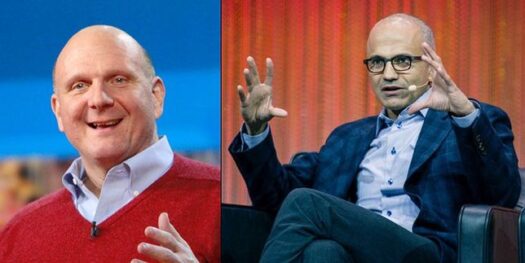For fourteen years, Microsoft had a larger-than-life CEO, his intensity the stuff of legend. He embraced a radical candor that sometimes meant meetings would devolve into shouting matches. He implemented a stack-ranking system that mirrored his own love of competition. The spotlight found him, and he consumed much of the oxygen in the room.
His name was Steve Ballmer, and if you invested $1,000 in Microsoft on January 13, 2000, his first day as CEO, you would have had $702 at the end of his tenure.
Satya Nadella struck people as an odd choice to shake things up. Compared to Ballmer, he came across as quiet, more interested in talking engineering than delivering thundering speeches. Dennis Berman of the “The Wall Street Journal,” called him an “unproven quantity.” Many advocated for an outsider who would look at the business with fresh eyes. “What is Microsoft? It tries to be too many things to too many people, and that will be Nadella’s challenge,” said Berman.
That was one of several challenges.
Nadella connected with people on a human level, promoting empathy and humility. He worked to shift Microsoft from a culture where your teammates were competition to a culture where teamwork fostered innovation. He made this shift with a steely resolve, demonstrating toughness and resilience.
This leadership approach allowed Microsoft, who had seemingly missed out on the mobile revolution and had become a technology laggard, to make several key strategic decisions. They went all in on the cloud and now, through their partnership with OpenAI, occupy a leadership position in what many believe will be the most transformative technology since electricity.
But the real change was cultural. Under Ballmer, know-it-alls who horded information and power fared well in the stack ranking system. Nadella evangelized growth over fixed mindsets, encouraging everyone to read Carol Dweck’s seminal work. He promoted learn-it-alls who shared their mistakes and connected others with a larger purpose.
Here’s an excerpt from his introductory email on February 4, 2014: “Many who know me say I am also defined by my curiosity and thirst for learning. I buy more books than I can finish. I sign up for more online courses than I can complete. I fundamentally believe that if you are not learning new things, you stop doing great and useful things.”
What’s true for Microsoft is true for all of us. Humility, empathy, and insatiable curiosity will carry us into this next age. Provided we practice them with a toughness and resilience, we can and will do “great and useful things.” To be always learning new things is to be fully alive.
Oh, and that $1,000 investment? If you’d made it on February 4, 2014, Nadella’s first day, it would be worth more than $10,000 today. Not bad for an “unproven quantity.”
